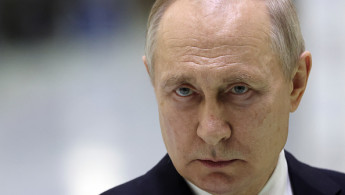Putin condemns Quran burning during Dagestan mosque visit
Russian President Vladimir Putin has criticised Western countries that allow the burning of the Quran on grounds of free speech, saying such acts are criminalised by Russia.
Putin made the remarks during a visit to meet Muslim representatives at the Juma Mosque in Dagestan's Derbent on Wednesday, where he was given a copy of the Quran as a gift. He expressed criticism towards Western nations that do not consider Quran burning a crime, emphasising that Russia penalises such actions.
"The Quran is sacred for Muslims and should be sacred for others," Putin was quoted by the Turkish Anadolu Agency as saying. He expressed gratitude for the gift and stated: "I will always abide by these rules.”
Putin's remarks follow international controversy sparked by the burning of a copy of the Quran outside a mosque in Stockholm. The incident was reportedly carried out by an Iraqi refugee in Sweden, who allegedly obtained written approval from the police.
Several Arab states and organisations have strongly condemned the incident.
The Iraqi government described it as "a reflection of a hateful aggressive spirit that is far removed from freedom of expression." Egypt, Kuwait, Jordan, Yemen, and Saudi Arabia also issued statements condemning the burning of the Quran. Meanwhile, Morocco and the UAE have recalled their ambassadors to Sweden over the incident.
The Gulf Cooperation Council (GCC) urged the Swedish government in a statement to "immediately take actions to prevent these acts that indicate malice, hatred, and extremism.”
The Juma Mosque, where Putin made his comments, is the oldest mosque in Russia and one of the oldest worldwide. While his condemnation of Quran desecration might be seen as a defence of the Muslim community, Putin has made Islamophobic comments in several incidents that encouraged violence against Muslims in Chechnya and Dagestan.
During the Second Chechen War, Putin referred to Muslims in Russia as potential Islamist fundamentalists who could support the radical Chechen project of establishing an Islamic state in the Caucasus.
"If extremist forces manage to get a hold in the Caucasus, this infection may spread up the Volga River, spread to other republics, and we either face the full Islamisation of Russia or we will have to agree to Russia's division into several independent states." Putin said in 2000.
According to a 2011 Pew project report, Islam is a minority religion in Russia, but the country has the largest Muslim population in Europe, with approximately 16 million Muslims, accounting for around 12% of the total population. The majority of Muslims in Russia follow Sunni Islam, while a small percentage are Shia Muslims. Sunni Sufi orders, specifically Naqshbandi and Shadhili schools, have a notable presence in Dagestan and Chechnya.





 Follow the Middle East's top stories in English at The New Arab on Google News
Follow the Middle East's top stories in English at The New Arab on Google News


